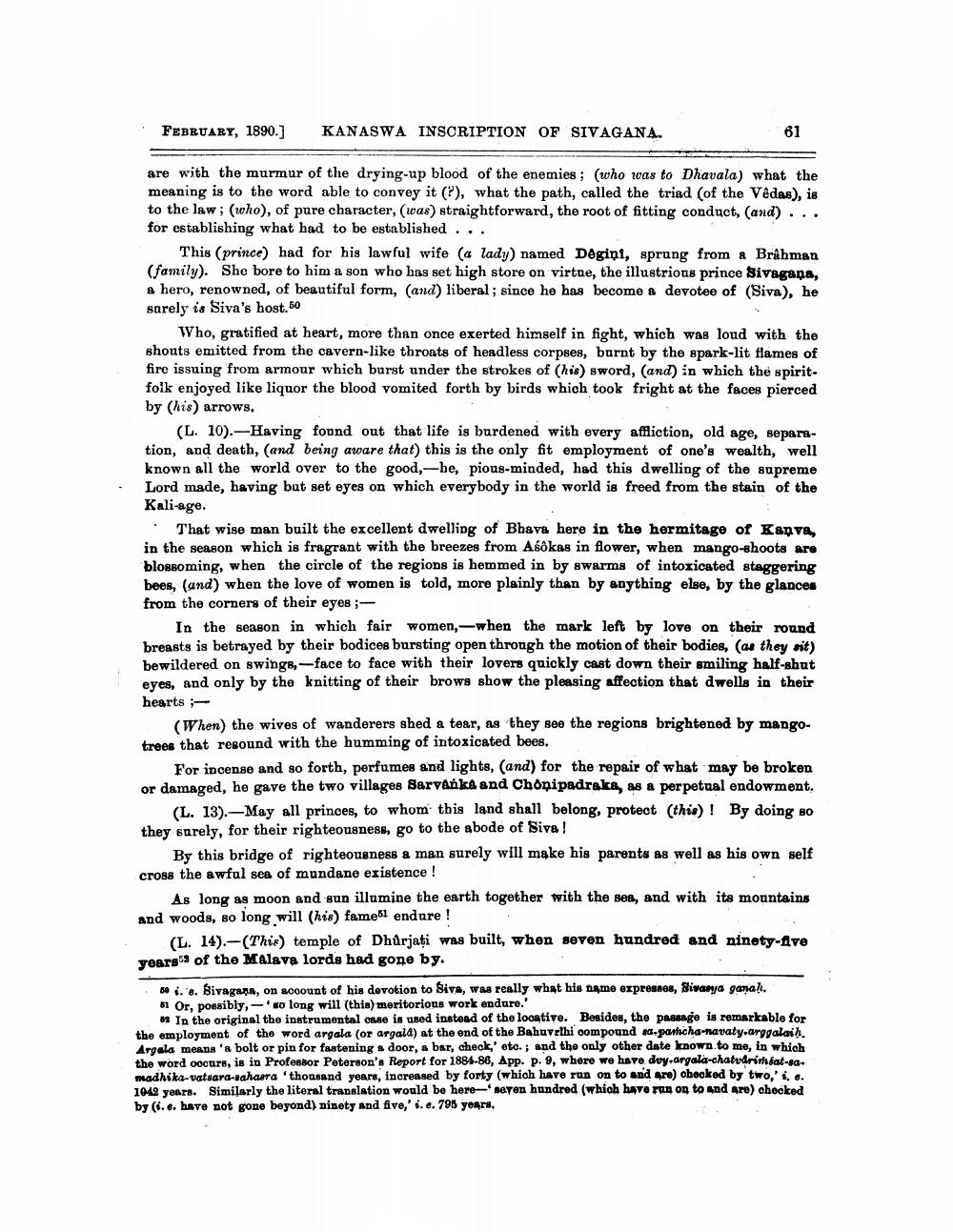________________
FEBRUARY, 1890.)
KANASWA INSCRIPTION OF SIVAGANA.
61
are with the murmur of the drying-up blood of the enemies ; (who was to Dhavala) what the meaning is to the word able to convey it (+), what the path, called the triad (of the Vedas), is to the law; (who), of pure character, (was) straightforward, the root of fitting conduct, (and) ... for establishing what had to be established ...
This prince) had for his lawful wife (a lady) named Degini, sprung from a Brahman (family). She bore to him a son who has set high store on virtue, the illustrious prince Sivagana, a hero, renowned, of beautiful form, (and) liberal; since he has become a devotee of (Siva), he sarely is Siva's host. 50
Who, gratified at heart, more than once exerted himself in fight, which was loud with the shouts emitted from the cavern-like throats of headless corpses, burnt by the spark-lit flames of fire issuing from armour which burst under the strokes of (his) sword, (and) in which the spirit. folk enjoyed like liquor the blood vomited forth by birds which took fright at the faces pierced by (his) arrows.
(L. 10).-Having found out that life is burdened with every affliction, old age, separation, and death, (and being aware that) this is the only fit employment of one's wealth, well known all the world over to the good,-he, pious-minded, had this dwelling of the supreme Lord made, having but set eyes on which everybody in the world is freed from the stain of the Kali-age.
. That wise man built the excellent dwelling of Bhava here in the hermitage of Kanva, in the season which is fragrant with the breezes from Asokas in flower, when mango-shoots are blossoming, when the circle of the regions is hemmed in by swarms of intoxicated staggering bees, (and) when the love of women is told, more plainly than by anything else, by the glances from the corners of their eyes ;
In the season in which fair women, when the mark left by love on their round breasts is betrayed by their bodices bursting open throngh the motion of their bodies, as they nit) bewildered on swings, -face to face with their lovers quickly cast down their smiling half-shut eyes, and only by the knitting of their brows show the pleasing affection that dwells in their hearts;
(When the wives of wanderers shed a tear, as they see the regions brightened by mangotrees that resound with the humming of intoxicated bees.
For incense and so forth, perfumes and lights, (and) for the repair of what may be broken or damaged, he gave the two villages Sarvanka and Chonipadraka, as a perpetual endowment,
(L. 13).-May all princes, to whom this land shall belong, protect (this)! By doing so they surely, for their righteousness, go to the abode of Siva!
By this bridge of righteousness a man surely will make his parents as well as his own self cross the awful sea of mundane existence !
As long as moon and sun illumine the earth together with the sea, and with its mountains and woods, so long will (his) famel endure !
(L. 14).-(This temple of Dhärjati was built, when seven hundred and ninety-five years of the Malava lords had gone by.
.6 1. e. Bivagana, on scoount of his dovotion to Siva, was really what his name expresses, Sivasya ganah.
01 Or, possibly, - so long will (thia) meritorious work endure.'
m In the original the instrumental nae is used instead of the locative. Besides, the passage is remarkable for the employment of the word argala (or argala) at the end of the Bahuvethi compound aa-pancha-navaty.arggalaih. Argala means'a bolt or pin for fastening & door, a bar, check' etc.; and the only other date known to me, in which the word oocurs, is in Professor Peterson's Report for 1884-86, App. p. 9, where we have doy-argala-chatvarimfat-sa. madhika-vatsara-sahasra 'thousand years, increased by forty (which have run on to and are) cheoked by two,', 6. 1042 years. Similarly the literal translation would be here-seren hundred (which have run on to and aro) checked by i.e. have not gone beyond) ninety and five,' i.e. 795 years,




